| |
Taken from Treble (Aug 10, 2021)
Celebrate the Catalog: The Parliament-Funkadelic albums
by Jeff Terich
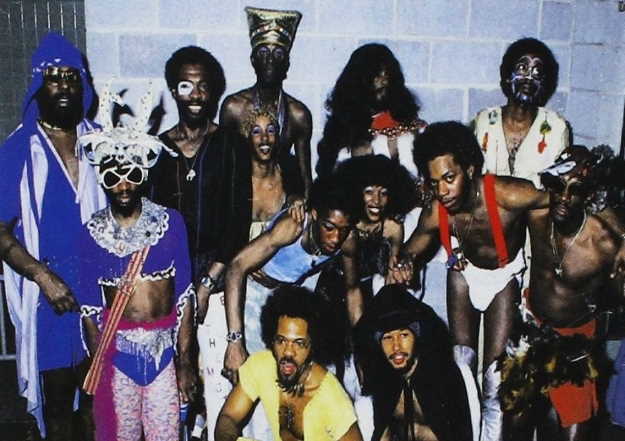
Parliament-Funkadelic band via albumism.com |
It all started with a doo-wop group. In the 1950s, George Clinton formed The Parliaments in the back of a barber shop in Plainfield, New Jersey with Ray Davis, Fuzzy Haskins, Calvin Simon and Grady Thomas. Though their single "(I Wanna) Testify" became a hit single for the group, their label Revilot went bankrupt, and they temporarily lost the rights to use the name The Parliaments. Which ultimately sparked a reinvention; the group changed their name to Funkadelic on the suggestion of bassist Billy Bass Nelson, and what followed was a revolution in groove.
The dual careers of Parliament and Funkadelic-two complementary but separate entities led by Clinton and featuring mostly the same musicians-brought about a sea change in popular music. Though they were ultimately a countercultural force-challenging the status quo in popular music through oddball narratives, censorship-baiting artwork and lyrical themes, subversive social commentary disguised in sci-fi imagery and an endless well of musical experimentation-it's difficult to imagine the landscape of popular music today without their massive influence. Prince, Talking Heads, De La Soul, Public Enemy, and essentially the entire g-funk sound-heavily based around samples and sounds pioneered by Clinton and company-all owe a debt to the sonic exploration that Parliament and Funkadelic underwent. Not to mention the greatest weapon in their arsenal (other than the bop gun and the flash light): Funk.
"Funk is whatever it needs to be to give you that freedom, to let go and try whatever you're doing", Clinton told NPR earlier this year. "You're being funky when you just let yourself go and freestyle, or whatever you want to call it".
This year marks a lot of important anniversaries for the P-Funk universe: The 50th anniversary of Maggot Brain, the 45th anniversary of The Clones of Dr. Funkenstein and Hardcore Jollies. Plus the 80th birthday of the maestro himself, George Clinton. So to celebrate, I've taken a deep dive into all 24 Parliament-Funkadelic albums, ranked and rated and given a deeper listen.
Osmium (1970)
Label: Invictus
Rating: 8.0
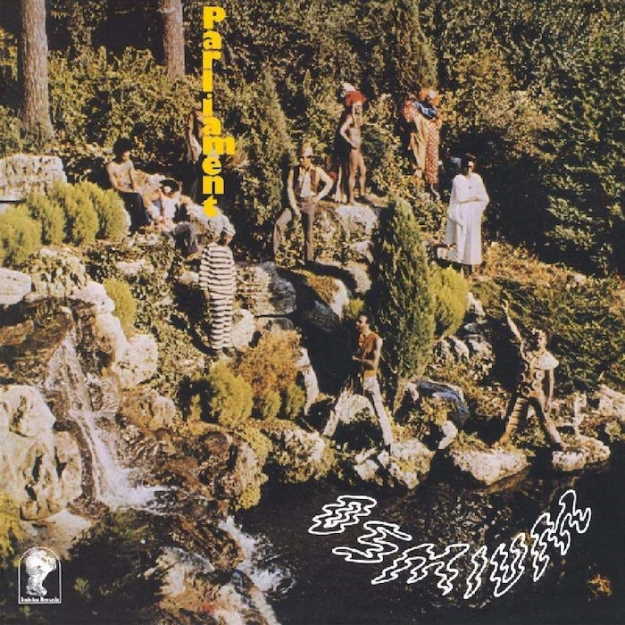 |
Parliament is a band with a legendary aesthetic-space-age onstage antics, wild wardrobes, comic-book storylines, and whole lot of synthesizer-driven funk. Osmium has almost none of that, which makes it a particularly strange entry in the band's discography, having far more in common with the blazing psychedelic rock of Funkadelic, but far, far messier. Osmium is an album brimming with contradictions, at times beautiful and spiritual, as when Bernie Worrell delivers a permutation of Pachelbel's "Canon" in "Oh Lord Why Lord / Prayer". It's also frequently goofy; I know what you're thinking-Parliament was goofy! (and endearingly so)-but not goofy in the way "My Automobile" is, which sounds not so much like cartoon space funk as the band playing Grateful Dead for four minutes in the service of a song about having a car to pick up girls (and then a skit at the end in which the girl still won't kiss the guy with the wheels). The humor and vibrancy of George Clinton and company are all still here, as are some pretty spectacular songs-in particular the Eddie Hazel-driven rock anthems "Livin' the Life" and "There Is Nothing Before Me But Thang". And "The Silent Boatman" is a remarkably beautiful song at that. What it's missing is a singular aesthetic-the X factor that made Parliament the legendary phenomenon that it was. Osmium is a good psychedelic soul album, but it's only a mere hint of what was possible.
Funkadelic (1970)
Label: Westbound
Rating: 9.0
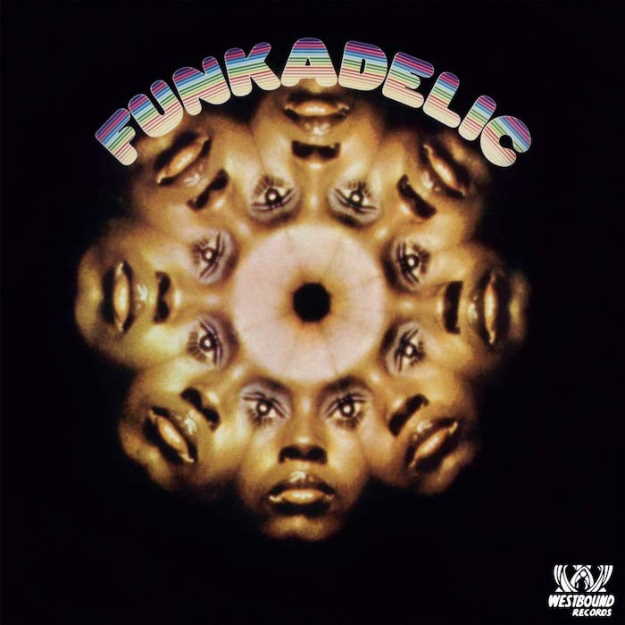 |
The great irony of Funkadelic was that, of George Clinton's two overlapping ensembles, it was just as much a rock band-if not more so-as a funk band. A great one, I might add-the kind of rock band that saw outside of the lines of genre but still managed to absolutely nail the one they ostensibly chose. The group's debut album, released after transitioning away from their doo-wop roots as The Parliaments-and released the same year as the debut album by Parliament-Funkadelic is as much a blues album as it is a rock album, as much as it is a funk album, none of which are necessarily definitive. But nobody else made music that sounded quite like it at the time, save for a dynamic act like Sly & the Family Stone. It's flanked by two heavy questions, "Mommy, What's A Funkadelic?" and "What Is Soul", the structure of the album similar to that of their career-defining masterpiece Maggot Brain. And if it pales to that album, it's only because that record is the kind that still sends ripples throughout popular music 50 years later. These two tracks alone are worth the price of admission, the former a spoken-word Clinton vamp over one of the album's deepest grooves, while the latter is a psychedelic vibe rider heavy on groove and echo effects worthy of King Tubby. There are highlights in between, most notably "I Got A Thing, You Got A Thing, Everybody's Got A Thing", rich in group vocals and Eddie Hazel's ripping wah-wah riffs. But much of the rest of the material eases into a laid-back, swampy blues sound that sounds great on vinyl but falls short of transcendent. Not that you could call anything here disappointing in the slightest-we're grading on a curve here, after all.
Free Your Mind... And Your Ass Will Follow (1970)
Label: Westbound
Rating: 8.6
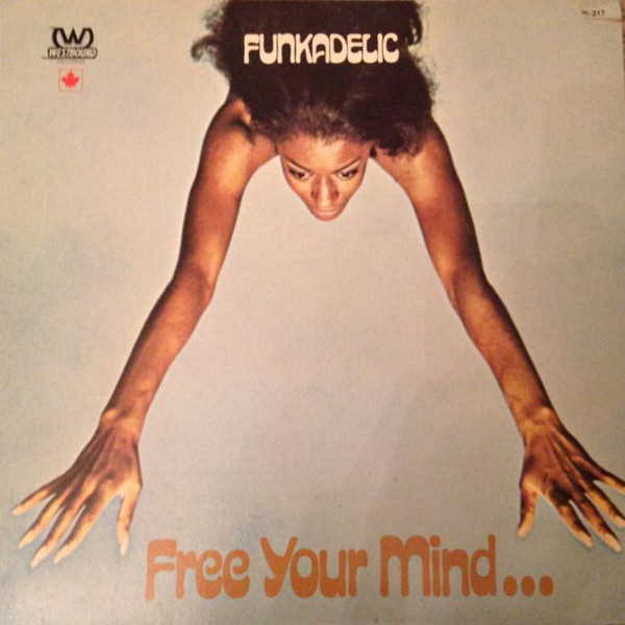 |
And now, even more -adelic. Funkadelic's second album, released only months after their eponymous debut, found the Detroit outfit pushing deeper into the weirdest elements of their sound, with production and effects treatments that seemed to mirror the copious amounts of LSD that the band had surely been using in the studio at the time. The panning on Free Your Mind is nearly excessive to the point of absurdity, and there are times during which the epic title track seems to disappear or submerge itself underwater. There's no making complete sense of what's happening at all times, and that's in large part what makes Free Your Mind a unique listening experience. You could smooth out the more baffling elements of the production, or you could draw the hooks forward a bit, but it would remove the druggy, cosmic strangeness of the album-the utopian psychedelia that finds liberation through bodily movement. Funkadelic never had a better album title than this, if only because it's such a universal sentiment. That said, this is something beyond party music. The title track, heavy on echo and ambient space, nods to Sun Ra as much as it does Jimi Hendrix, though it'd be a few years yet before Clinton and company would take up semi-permanent residence in space. It's audaciously anti-commercial-a lot of the album is. "Friday Night, August 14th" is a rare moment of more straightforward funk rock, and "Funky Dollar Bill" has a groove and urgency that makes it an immediate standout, the realization of which occurs just a little before some disembodied reverb piano floats into the mix like a UFO invasion. "Some More" is a great swampy blues number, with Clinton's vocals clouded in thick, syrupy leslie effects, and "Eulogy and Light" closes the album with a twisted take on a Biblical verse, juxtaposed against backward masking and the kind of apocalyptic head-trip that characterized their next album. Even if Free Your Mind didn't always stand up to the best songs that Funkadelic wrote, it made up for it in the excitement of going where no funk or rock band had gone before.
Maggot Brain (1971)
Label: Westbound
Rating: 10.0
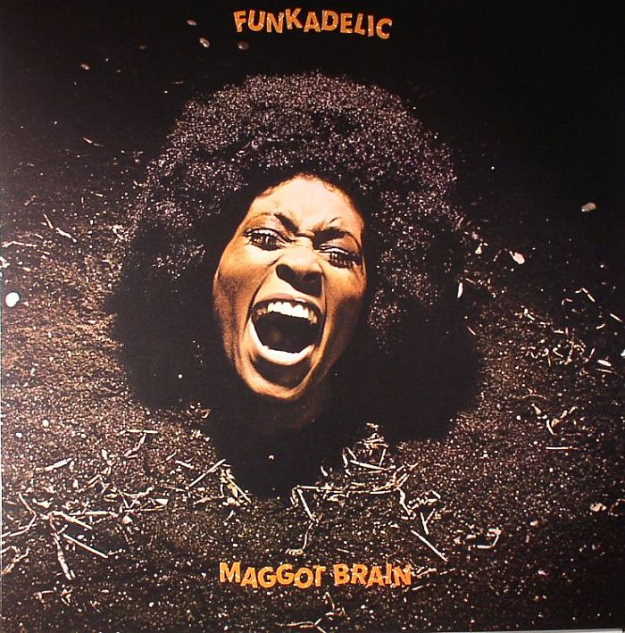 |
The impact of Maggot Brain is immeasurable. It's a funk album, and it's a rock album, but more than that it's an expression of things that can't be properly articulated-they can only be felt. Whether that's the 10 minutes of anguish that Eddie Hazel works through on the awe-inspiring performance of the title track-a cosmic dirge that solidified his status as one of the greatest players to ever pick up a guitar-or the deeply physical groove that pulses through "Hit It and Quit It". This is music of feeling more than intellectualizing, of emotion more than contrivance. It's the greatest piece of music that Funkadelic ever put to tape, the towering masterpiece of the entire P-Funk empire. It nearly stands alone, separated from the mythos that followed both groups thereafter, from the Pedro Bell artwork to the sci-fi narratives. It's gritty and grounded but aiming toward the stars, a struggle between a grimy realism and a vision of apocalypse. ("Wars of Armageddon", nearly as long as the title track, is jazz fusion as endtimes drone.) Maggot Brain covers a lot of ground in its seven tracks, from the earthy gospel of "Can You Get to That" to the heavy metal freakout "Super Stupid", which gave Rage Against the Machine the template they've pretty much stuck to throughout their career. But it's hard not to keep coming back to that heart-aching, face-melting performance in the title track, as strong a piece of evidence that whatever expectations Funkadelic were met with, they'd gladly meet with something wildly left-field.
America Eats Its Young (1972)
Label: Westbound
Rating: 8.4
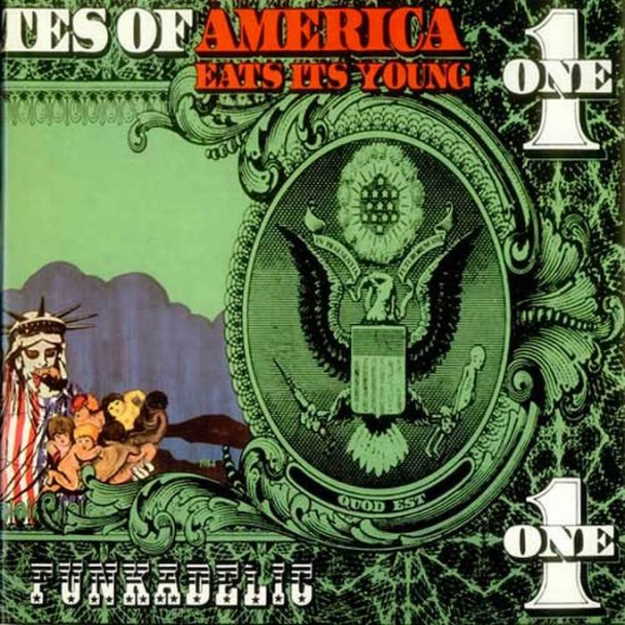 |
After Funkadelic deliver their best album, they follow it up with one of their biggest. Not commercially, but rather one of their longest at nearly double the running time of their average album. There's a lot happening on America Eats Its Young: 14 songs and seemingly as many different approaches, the sprawl and eclectic nature of which has led to this being characterized as the band's White Album, albeit one with a cover shot of Lady Liberty devouring babies. That's perhaps a useful lens through which to view the album, but most of what it shares with The Beatles' iconic album is a tendency to try just about everything. After all, they had already delivered a psychedelic masterpiece in the form of Maggot Brain, so why the hell not? Consider it a sampler of everything Funkadelic was capable of at the time: a greasy funk jam on "You Hit the Nail on the Head", gospel on "Everybody Is Going To Make It This Time", string-laden groove on "A Joyful Process", ass-shaking funk on "Loose Booty" and the guitar freakouts of "Miss Lucifer's Love". Add to that a few more straightforward rock songs like "Philmore" and "Balance", nodding to the group's first couple of albums, and there's a lot to love here. There's a unifying groove that keeps the album from ever feeling to disjointed, which is remarkable not just for how much material there is, but because the band had shed so many members beforehand, leaving only original members George Clinton, Eddie Hazel and Bernie Worrell. That makes this a slightly more awkward transition, but the wealth of ideas makes up for any perceived lack of focus. And while there's certainly enough to trim to make this a perfect album, that it feels so wildly unpredictable and brimming with inspiration makes it successful far more often than not, a wild ride worth taking even for the few bumps.
Cosmic Slop (1973)
Label: Westbound
Rating: 9.2
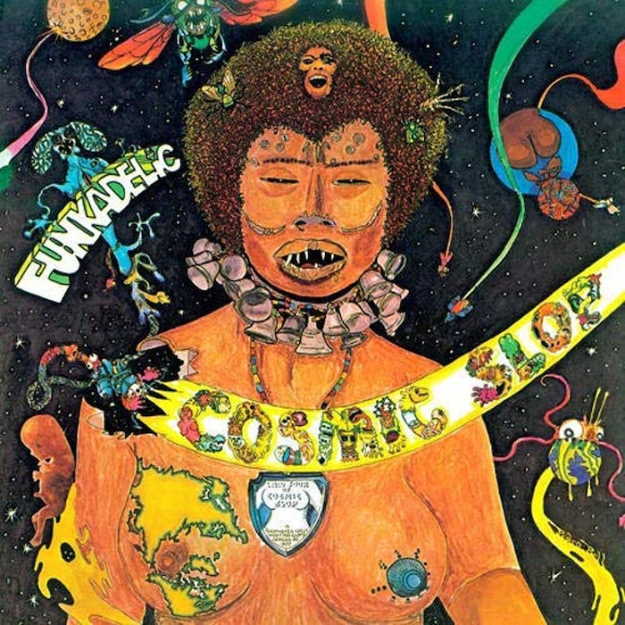 |
If Cosmic Slop immediately sounds as if something had been stripped away from the Funkadelic sound, it can mostly be boiled down to the absence of Eddie Hazel, whose guitar work essentially defined their sound up to that point. For about two years, Hazel had stepped away from Funkadelic due to a financial dispute, eventually returning on 1974's Standing on the Verge of Getting It On. But on Cosmic Slop, that absence is more keenly felt, his face-melting guitar work nowhere in sight, and most of its songs carrying a dark pallor and a sense of understated doom. These songs don't bounce, they slink, and they don't catch fire, they merely smoke. From the opening strut of "Nappy Dugout", it feels like more low-key affair, but not much more. This is still Funkadelic, there's still a lot happening, and most of it spectacular. Tracks like the glorious, mic-passing "You Can't Miss What You Can't Measure" and the organ-driven swirl of "Let's Make It Last" feel more aligned with Sly and the Family Stone's psychedelic soul celebrations, while the masterpiece of a title track could have been a bonus track on Curtis Mayfield's cinematic masterpiece Superfly. Much like its predecessor, Cosmic Slop stretches pretty far into any number of different directions, and some of the most surprising material here is also some of the best, like the mournful and otherworldly "March to the Witch's Castle". Clinton's trademark absurdity is still on display here, particularly on "No Compute", but by and large this is a much more pessimistic offering from Funkadelic, one that's at times less joyful and more sober, but no less dazzling.
Up for the Down Stroke (1974)
Label: Casablanca
Rating: 8.5
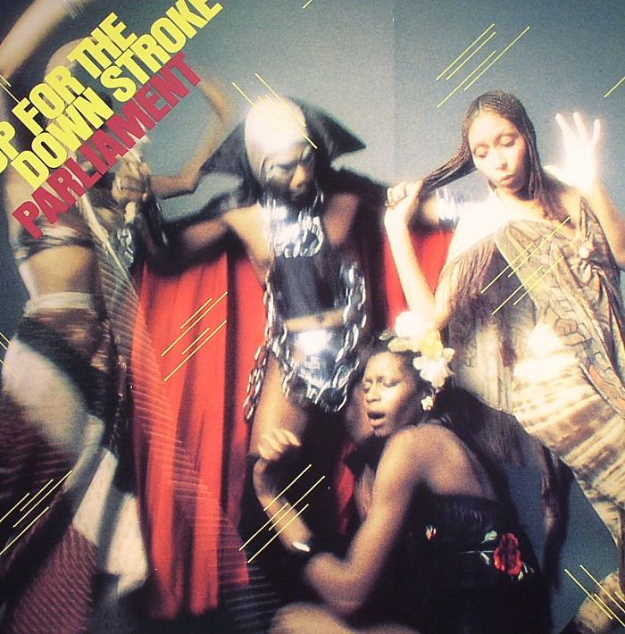 |
It's tempting to call Up for the Down Stroke Parliament's actual debut, considering how separate Osmium feels from the direction the group took thereafter. In fact, that album could just as easily be an argument for being part of the Funkadelic catalog instead, its peaks driven by Eddie Hazel's fiery guitar work and Tiki Fullwood's driving rhythms rather than the "P-funk" sound that Parliament pioneered a few years later. Up for the Down Stroke is where that sound begins to take shape. The title track of Up for the Down Stroke is the arrival of Parliament as we now know them-deeply funky, celebratory, over-the-top, and driven by richly overstuffed arrangements full of horns and keyboards. It's also the first of the band's singles to chart, reaching number 10 on the Billboard R&B chart. Structurally it feels less like a pop song than a jam session with call-and-response chants, but the feeling is undeniable. That in large part is what makes this album an improvement over its predecessor, though it does feel at times as if it could be a Funkadelic album-the two Clinton-helmed bands, which shared lineups, were touring together at this point. But Stroke finds Parliament breaking out into their own lane, delivering an album of hard-driving funk that's still not quite the front-to-back classic that some of their late-'70s material would be, but nonetheless contains highlights such as the infectiously reworked Parliaments single "Testify" and the epic rhythmic jousting match "The Goose". Parliament would blast off into far off realms in just a couple of short years, but they had already begun to chart their path.
Standing on the Verge of Getting It On (1974)
Label: Westbound
Rating: 9.4
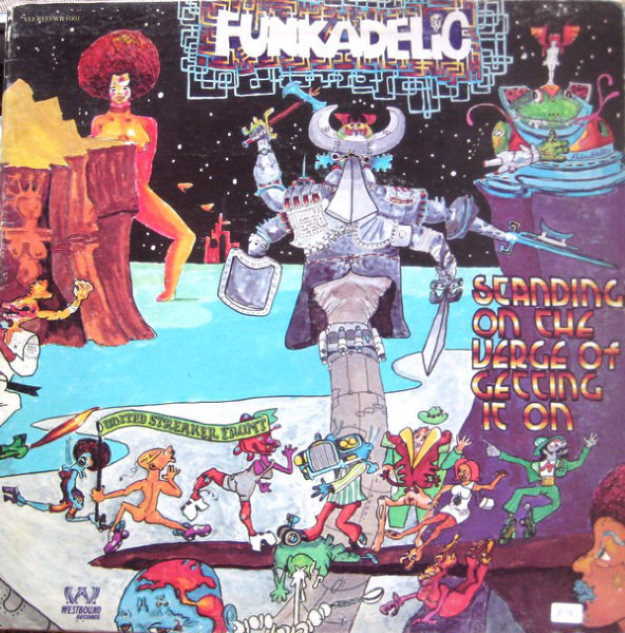 |
The same month that Parliament made their chart-breaking return with Up for the Down Stroke, Funkadelic were completing their psychedelic funk Voltron of more than a dozen members, not the least of which is Eddie Hazel, who after having a minimal role on previous effort Cosmic Slop, co-wrote every song on Standing on the Verge of Getting It On, some of which was under the name Grace Cook (his mother's name). That same year he also was indicted for assaulting airline staff, so it wasn't all so bright in his world, necessarily. But Hazel's a big reason for why this album stands among the greatest moments in the Funkadelic catalog, most of its tracks and certainly all of its greatest ones-like the driving, riff-heavy title track-heavily guitar-centric. Likewise, the group puts plenty of emphasis on the "funk" part of their name in "Red Hot Momma", blaze into heavy AF stoner groove on "Alice in My Fantasies" with the kind of dirty talk that only makes sense after lots and lots of drugs ("She said she would, uh, suck my soul if I lick her emotion") and "I'll Stay" is an actually sensual torch song that strips away some of the absurdity in favor of pure feeling. But that absurdity returns with "Jimmy's Got a Bit of Bitch In Him", a Zappa-esque LGBTQ hallucination partially intended to make the suits uncomfortable, but ultimately a bawdy celebration of letting your freak flag fly. Which is what Funkadelic, on the whole, was about, and here they hold nothing back save for the fact that it's only about half the length of America Eats Its Young. The difference is that everything here lands with the impact it warrants, and in all its electrified glory, it's the next album in sequence to fly so close to Maggot Brain's sun.
Chocolate City (1975)
Label: Casablanca
Rating: 8.3
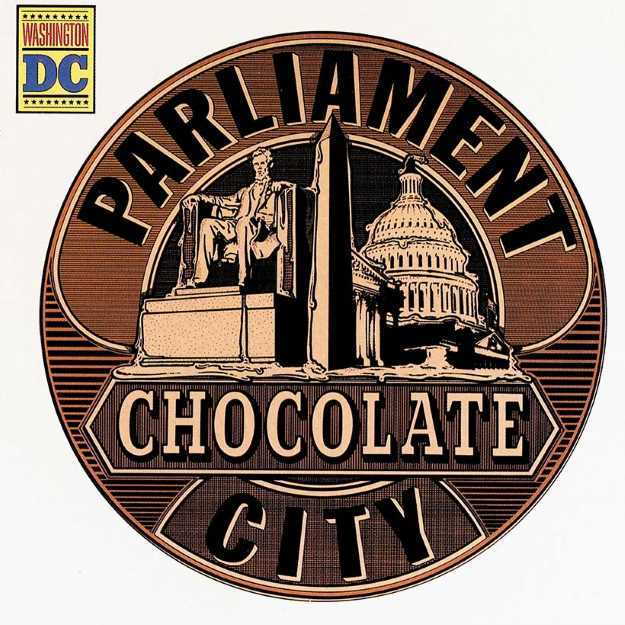 |
Parliament didn't make protest albums in a purely literal sense-their Afrofuturist vision wasn't wholly escapism, but there was certainly plenty of that to go around. Chocolate City is as much an excuse to fill dancefloors as any other Parliament album-though not necessarily the airwaves, as it didn't have the benefit of a hit single like "Up for the Down Stroke". But it's also a call for Black political empowerment, one that's as good-humored as it is defiant. Clinton and company imagine a Washington, D.C. occupied by Black greatness in the aftermath of Nixon's departure in disgrace. The title track is pure, ecstatic funk, made all the more memorable through Clinton's one-liners ("They call it the White House, but that's a temporary condition") and appointments to a presidential cabinet that includes Minister of Education Richard Pryor and Secretary of Fine Arts Stevie Wonder. Much of the appeal here is due to the title track alone, but while Chocolate City doesn't feel like the landmark that Parliament's next couple of studio albums would be, it's consistently solid and heavy on liquid basslines, thanks to a particularly on-fire Bootsy Collins, whose mastery of the low-end theory elevates the rest of the material.
Let's Take It To the Stage (1975)
Label: Westbound
Rating: 8.6
Funkadelic's final release for Westbound finds the band in top form, blazing right out of the gates with the furious "Good to Your Earhole", a rave-up that lives up to its name. This is Funkadelic at their leanest and tightest, all but the lengthy ballpark organ vamp "Atmosphere" and slow-burning ballad "Baby I Owe You Something Good" coming in at under three minutes apiece. The title track is Clinton with an unusually large chip on his shoulder, directing his shit-talk toward acts like "Fool and the Gang", with "No Head No Backstage Pass" narrating a predatory encounter between security guard and groupie. While the vibes here aren't so joyful, that fury gets poured into the music itself, giving even an extra brief track like "Get Off Your Ass and Jam" an added intensity. An explosive and concise set of songs before Funkadelic would undergo a major transformation.
Mothership Connection (1975)
Label: Casablanca
Rating: 9.5
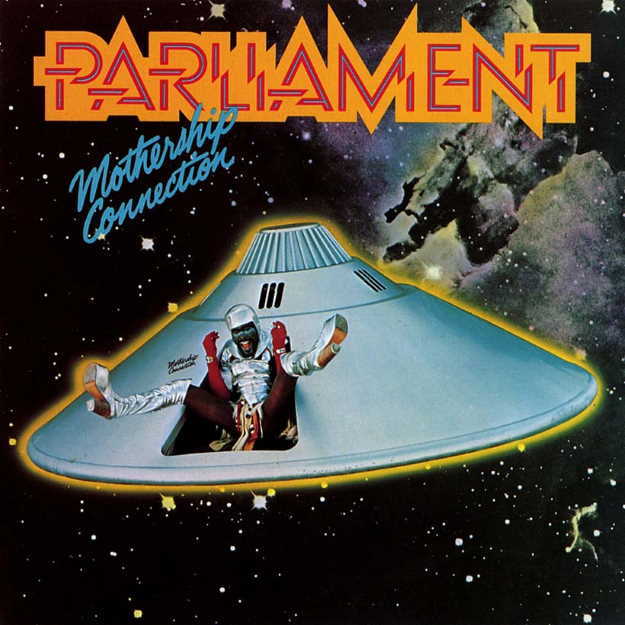 |
After George Clinton brought funk to the White House, the next natural step was to take it into outer space. That's both in terms of the theme behind Mothership Connection-a first contact with aliens through the power of funk (as we learn throughout the catalog, funk can really do so much)-and in terms of how significant of a world expansion this was for Parliament. It immediately sounds so much bigger and brighter than any Parliament album prior and scarcely even resembles the band on debut album Osmium. It also is the first of their albums to feature James Brown's horn section, which punctuates these tracks miraculously. There's a joy that permeates just about every corner of this album, making Clinton's Afrofuturist vision one of hope and possibility, and more than a little humor. But in tracks like "Star Child", which invokes "Swing Low Sweet Chariot" in its stunning bridge, that Mothership Connection feels most like a gospel album-a very funky gospel album. It's also the album that features the highest ratio of call-and-response chants, from "Make my funk the P-funk!" to the unforgettable chorus of "Give Up the Funk (Tear the Roof Off the Sucker)". It's Parliament's crowning achievement, and just a hair shy of being the best album of this whole batch.
The Clones of Dr. Funkenstein (1976)
Label: Casablanca
Rating: 8.5
The second in a sequence of sci-fi concept albums that find Parliament truly hitting their stride, The Clones of Dr. Funkenstein isn't the sort of record in which plot is all that important. It thematically revolves around clones, but if there's a true overarching concept here-as it is with every Parliament album-it's being as unabashedly funky as possible. Why else are we here, after all? And they deliver, naturally. Coming off the high of Mothership Connection, Clones is considerably goofier, but the sound is still dialed in and infectious. The horns that drive "Gamin' on Ya!" are irresistible, the disco pulse of "Getten To Know You" bumps without abandon, and "Everything is on the One" is essentially a how-to manual for being funky. And of course the cover art is fantastic. As usual.
Tales of Kidd Funkadelic (1976)
Label: Westbound
Rating: 7.1
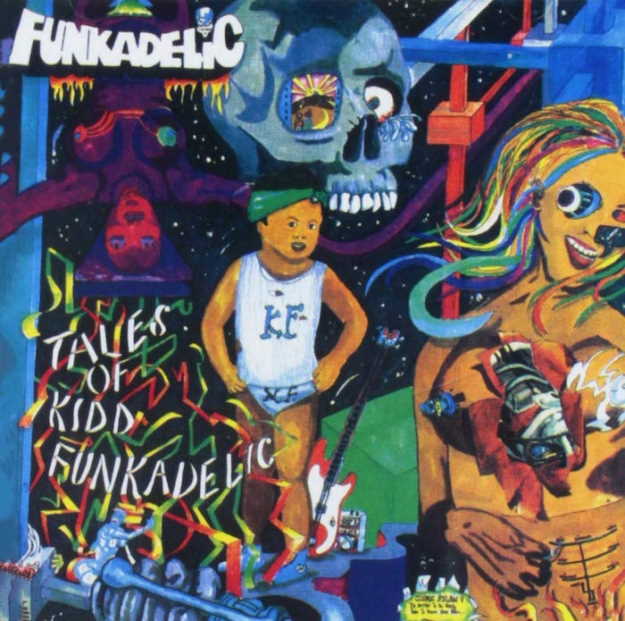 |
Every band has its contractual obligation album, and this is Funkadelic's, a compilation of outtakes released via Westbound as the group departed the label for Warner Bros. That alone pretty well summarizes the somewhat haphazard nature of the album, which feels less like a proper album-length statement-certainly not in the same way that Maggot Brain or One Nation Under a Groove are-than a mid-period Funkadelic mixtape. But the individual songs here suggest that Funkadelic's leftovers during their peak were still mostly hard to top. "Butt-to-Butt Resuscitation", a George Clintonesque title if their ever was one, is all fiery funk and psychedelic mayhem. "How Do Yeaw View You?" offers downtempo proto-g-funk P-funk that's genuinely sensual rather than just horny, and the 12-minute title track-despite being named for the group's new guitarist, Michael "Kidd Funkadelic" Hampton-is cosmic, synthified prog. On a song-by-song basis, there's a lot to like here, even if it doesn't all mesh together the way it should, but if nothing else it gives us the brief, super-fun "Let's Take It to the People", whose "Everything is fair when you're living in the cit-aaah" hook was given new life in A Tribe Called Quest's "Everything Is Fair".
Hardcore Jollies (1976)
Label: Warner Bros.
Rating: 8.2
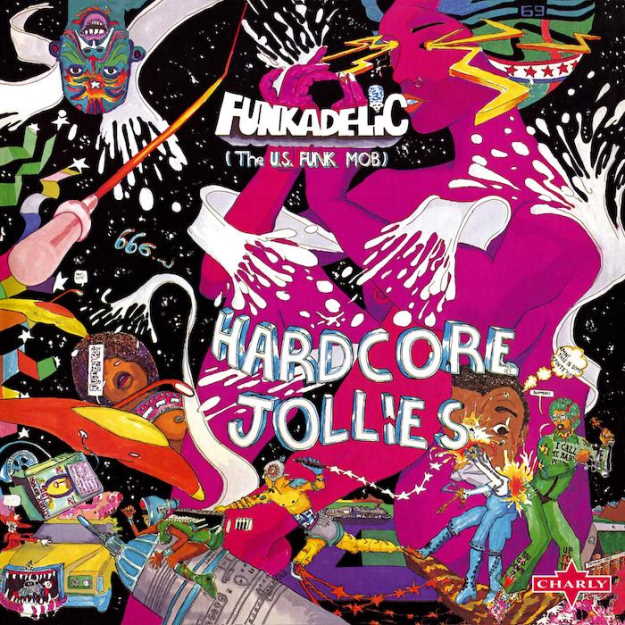 |
Hardcore Jollies seems to be one of the more overlooked entries in the Funkadelic catalog, and the fact that it's not available on streaming services doesn't necessarily help that (the entire WB series of albums is absent, for those keeping track). Which is curious considering several of the landmarks it seems to check off the list: It's the band's first album for Warner Bros., which elevated them to an even larger commercial platform after their tenure on Westbound. It's also the last album to feature three members of the original Parliaments: Fuzzy Haskins, Calvin Simon and Grady Thomas. Likewise, it marked the third album from the P-Funk collective in one year, even if one of them was technically a compilation of outtakes (but a pretty decent one!). Inexplicably, one of the tracks featured here is a live version of "Cosmic Slop", but that's the only real filler track here (and it's a killer live version, but why is it here?). What the album lacks in conceptual cohesion and overwhelming doses of oddball humor-which Parliament's next album would more than make up for-Hardcore Jollies makes up for in sheer instrumental fire. It's dedicated to "the guitar players of the world", and there are five guitarists on the album, which tells you a lot. It's arguably the last truly Hendrix-ian set of songs Funkadelic released, and they make the most of that psychedelic direction, with a spectacular helping of riffs and solos dominating the first half, with the second mostly comprising slow jams. And those are good, but really, if you love guitars, then there's no reason not to love Hardcore Jollies.
Funkentelechy vs. the Placebo Syndrome (1977)
Label: Casablanca
Rating: 9.3
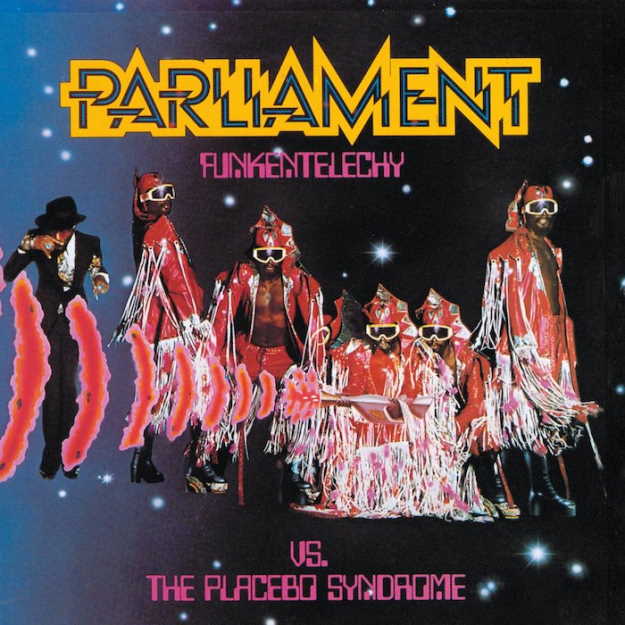 |
There are arguably more groundbreaking moments in the Parliament-Funkadelic catalog, but Funkentelechy vs. the Placebo Syndrome is the most quintessential to the P-Funk mythology. This is the album where Parliament go deep into the narrative of Star Child and Sir Nose d'Voidoffunk, creating a hero and nemesis battle that pits a joyful hedonism against a quirky, uptight villain based on someone Clinton knew back in Plainfield, New Jersey. Of course, even the song here that bears Sir Nose's name is an epic funk vamp made for moving that booty. Clinton, naturally, portrayed both characters. (The album also came packaged with a poster of Sir Nose and a comic book laying out the storyline-though Star Child's bop-gun blast on the cover art more or less tells you what you need to know.) It's probably a little strange to say an album with two 10-minute funk giants is "lean", but no moment here is wasted, and it all builds up to an iconic close: "Flash Light". This might not necessarily be the "best" P-Funk album, but "Flash Light" is the P-Funk song, their first No. 1 R&B track and the prototype for how to do a synth bassline. An absolutely perfect masterpiece of a funk song. Not necessarily the birth of synth-funk, but the most pristine execution of it. Even Sir Nose couldn't resist dancing to this one.
One Nation Under a Groove (1978)
Label: Warner Bros.
Rating: 9.4
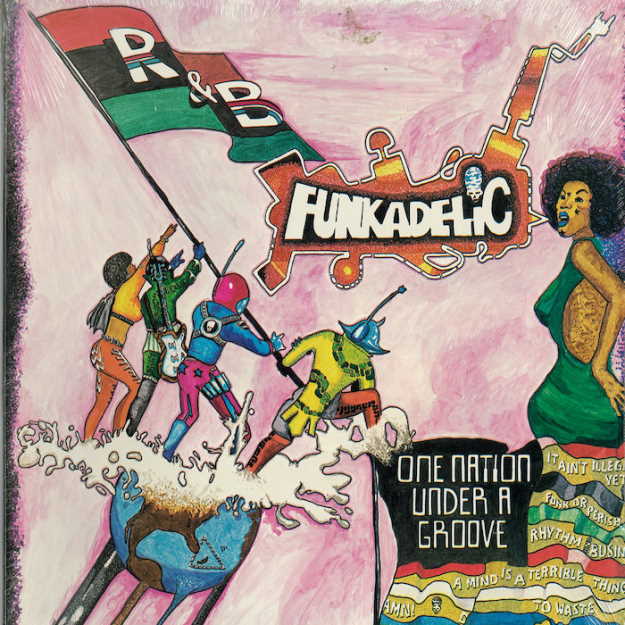 |
"One Nation Under the Groove" has been sampled in 85 songs according to WhoSampled. YG, Snoop Dogg, Janet Jackson, Ice Cube, D'angelo, En Vogue-just about everyone's borrowed a piece of the title track of Funkadelic's tenth album, the band's signature and best-known song. The rest of One Nation could be entirely forgettable, and it would still have that song. The chant-along chorus, the big synth-funk sound-it's funk perfection; when that song comes on, you have to move. There's no choice in the matter, really. The thing about One Nation is that it's much more than that song, though. Funkadelic-now featuring Ohio Players' Junie Morrison in their lineup-pull out the sexy slow jam "Into You", the blazing "Who Says A Funk Band Can't Play Rock 'n' Roll", and the pop-and-flex funk of "Cholly (Get Ready to Roll!)". There's also a scatalogical exercise that goes on for 11 minutes. As a friend of mine once said of the record, "One Nation Under A Groove is a great album...except for the song about shit". Honestly, even that one's pretty good for a significant chunk of that 11 minutes; "Promentalshitbackwashpsychosis Enema Squad (The Doo Doo Chasers)" and its shorter edit that shows up later on the album, probably occupy a little too much real estate on what's already a pretty long album. But all that shit-talk is mostly a means of getting to a larger point about...society or something? ("Psychologically speaking, we're in a state of mental diarrhea".) Or maybe it's just an excuse to make jokes about poo-Funkadelic did that sometimes. You come to expect the sacred with the profane, all of which is present here, but mostly the former.
Motor Booty Affair (1978)
Label: Casablanca
Rating: 9.1
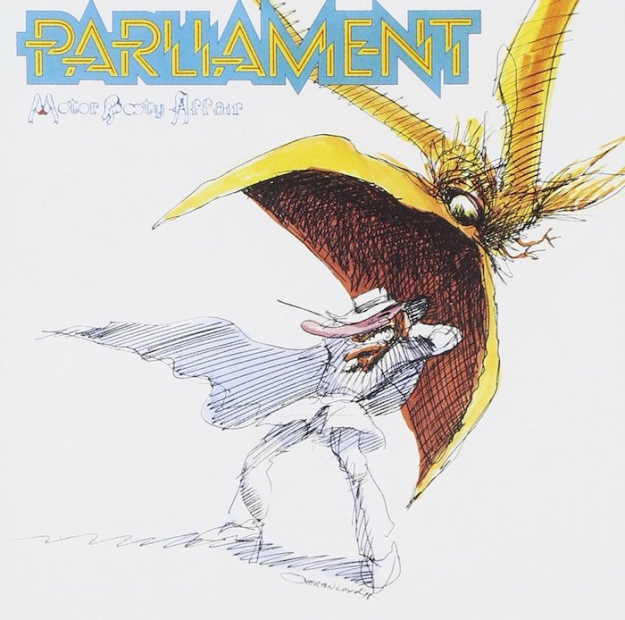 |
After the space album and the clones album, and then Star Child's face-off with Sir Nose d'Voidoffunk we have-the fish album. For some reason, that stands out as being particularly silly on paper, though really, the silliness is baked in at this point. Parliament could do fired-up anthems of empowerment or even spiritually charged and deeply moving music. But Motor Booty Affair is silliness as high-art-see how many oceanic puns you can count on a first listen, and then see if you can beat it on a second spin. And you should spin it repeatedly, because not only is Motor Booty Affair a funny album (Sir Nose not only doesn't dance, he doesn't swim!), it's one of their most front-to-back enjoyable, a set of songs that carries more purpose and direction than those on Dr. Funkenstein, if not necessarily the sense of miraculous inspiration as that of Mothership Connection. "Aqua Boogie" is the standout single, but it's the deeper cuts like "Liquid Sunshine" and the title track that bring the disco-funk dazzle, as well as closing track "Deep", one of the band's most pointed protest songs ("We need to raise Atlantis from the bottom of the sea"). Sometimes a goofy funk album about fish turns out to be a hell of a lot more than that.
Uncle Jam Wants You (1979)
Label: Warner Bros.
Rating: 7.8
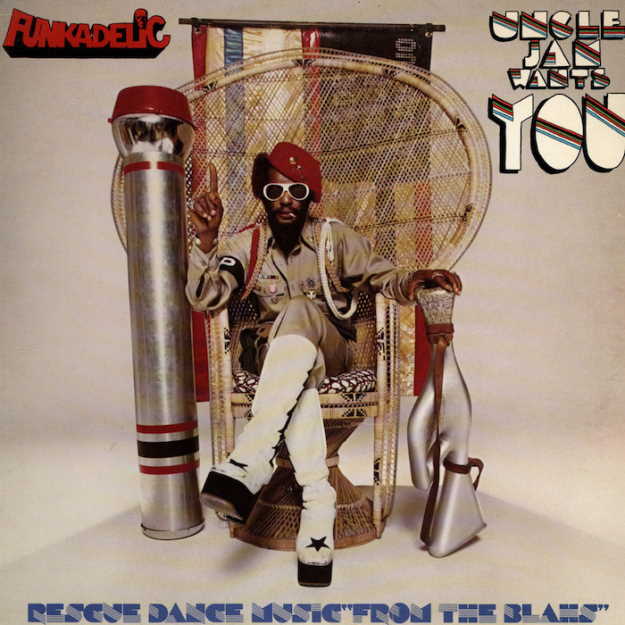 |
Funkadelic and Parliament were always as much about social commentary as they were cartoonish escapism, which are intertwined on Uncle Jam Wants You. It's right there on the cover art-Clinton posed in Huey Newton's chair, with flash light and bop gun, a revolutionary leading "soldiers on booty patrol". The commentary isn't necessary all that specific here-liberation through funk is, as always, the primary goal, and that's a kind of freedom always worth pursuing. But for all the iconography it invokes, Uncle Jam Wants You is weirdly lightweight in terms of its material. Save for the marching-orders title track, the second half feels mostly like b-sides to the three monumental tracks that precede them, in particular the 15-minute monolith "(Not Just) Knee Deep", later sampled in De La Soul's "Me, Myself and I" and earning every one of those minutes. The final three songs are enjoyable enough but inessential, making this not quite the important album that its revolutionary imagery suggests, but a solid enough late entry in the canon.
Gloryhallastoopid (Or Pin the Tail on the Funky) (1979)
Label: Casablanca
Rating: 4.5
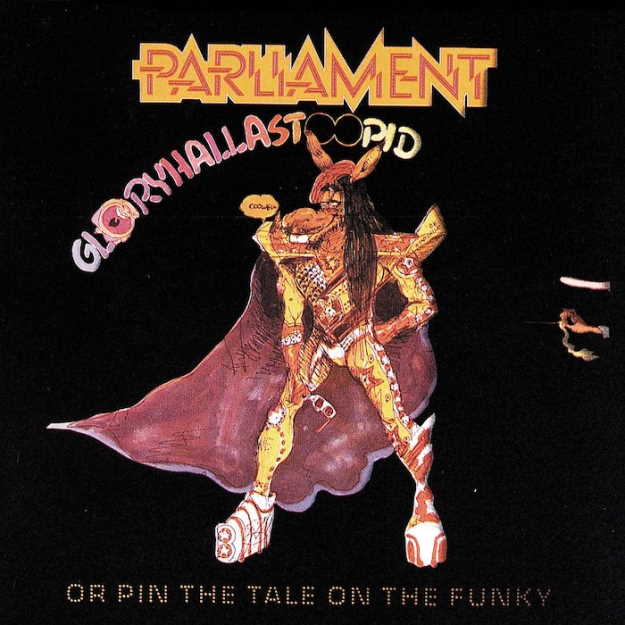 |
Gloryhallastoopid should be a lot better than it is. Released a year after the standout albums One Nation Under a Groove and Motor Booty Affair, and the same year as the solid if somewhat thin Uncle Jam Wants You, Gloryhallastoopid arrived during an era when both bands still had plenty left in the tank, or so it seemed. This is, apparently, where that all turns around. Take a particularly lackluster concept (the Big Bang was caused by Parliament's funk), a particularly bad 10-minute song (disco throwaway "Party People"), another lackluster nine minutes ("The Freeze (Sizzleanmean)"), and what's left is about half an OK album. What happened?! Well, a band that moves at this pace will eventually start to unravel, and the business conflicts between Clinton and numerous musicians also led to acrimony outside of the actual music. But more than anything it feels like the moment where the ideas truly ran out. They'd offer up one more slightly better offering before the wheels truly came off, but the ride is definitely coming to an end.
Trombipulation (1980)
Label: Casablanca
Rating: 6.0
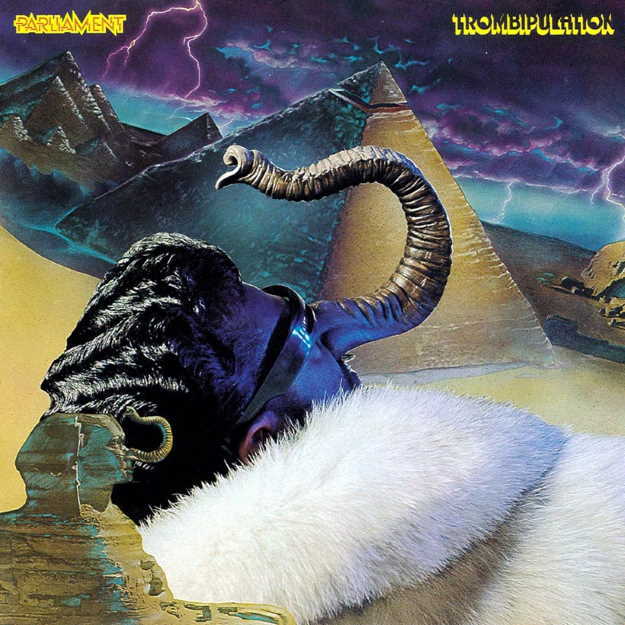 |
Both Funkadelic and Parliament made it into the 1980s, but just barely. By 1980, though, the band-inasmuch as it could still be called a band-was running on fumes and cocaine. Sir Nose D'voidoffunk provided Clinton and company plenty of fodder to explore double- or really even single-entendres to that effect throughout their last album for nearly 40 years. And while many members of the Parliament ensemble throughout the past decade appear on Trombipulation, it's primarily Bootsy Collins running the show here, and for his part, the album does have its share of cartoonish and deeply physical funk to go around, including "Let's Play House", which Digital Underground sampled in their hit "The Humpty Dance". But while the performances are strong enough, there are few true standout moments, and not a whole lot to sink your teeth (er, nose?) into beyond its rubberband basslines, particularly on the lackluster second half. The sound of a legendary band finally losing steam.
The Electric Spanking of War Babies (1981)
Label: Warner Bros.
Rating: 6.4
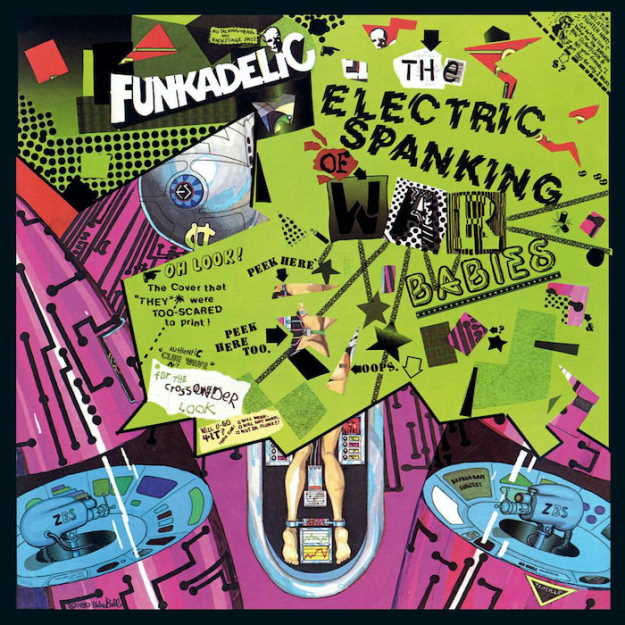 |
The last Funkadelic album for over three decades fares slightly better than the final Parliament album for a comparable stretch of time if only because it adapts much better to the new wave landscape of the time-in fact, Clinton's solo hit "Atomic Dog" was initially slated for this album, but cut after Warner Bros. nixed the idea of a double album. Electric Spanking ultimately suffers the fate of being a missed opportunity, from the curtailed tracklist to the censored album artwork (the phallic spaceship also didn't sit right with the label, either) to the fact that almost no original members were left in the group. But the spacey, synth-laden sound of the record shows where the group were headed, and it works more often than it doesn't. But it's hard to get around the idea that for all its potential, The Electric Spanking of War Babies isn't the album it could have been. That's a losing game, I know, but it's what we're left with. And as it is, this isn't a bad album, it's just not the album it should have been.
By Way of the Drum (2007)
Label: Hip-O Select
Rating: 5.5
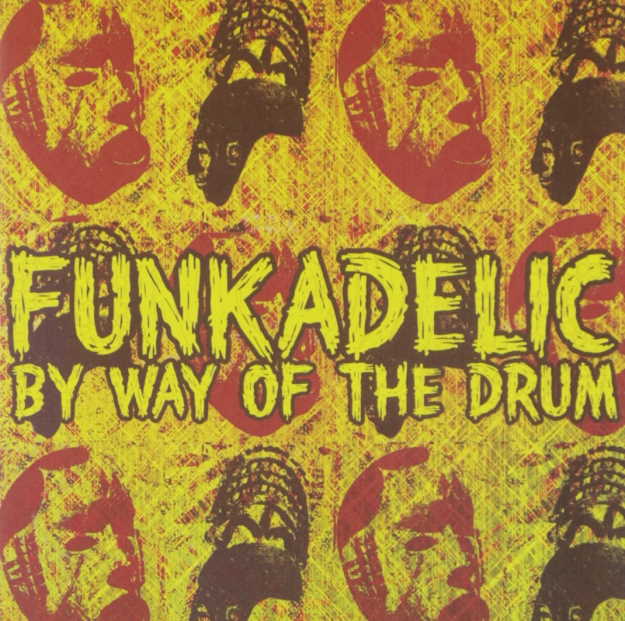 |
By Way of the Drum is that most curious of pop music artifacts: The "lost" album. Recorded between 1983 and 1985, it was intended to be the group's follow-up to 1981's The Electric Spanking of War Babies, but ended up being rejected by their label. And while it's not a totally unqualified failure by any means, it's easy to see why MCA passed on it-combining processed drum machine beats with some of the group's signature synth-laden funk and squealing guitar leads, it comes across like a Faith No More album produced by Jimmy Jam and Terry Lewis. (Or, if you prefer, a less inspired Prince.) Maybe that sounds pretty great on paper, I'll grant you, but in practice feels like something that's still trapped in the black hole of the mid-1980s. The label didn't get what they wanted, and given the success of Clinton's 1982 solo album Computer Games, it's understandable why they were disappointed. Still, the album was bootlegged for years before finally getting an official release in 2007, by which point it definitely sounded out of step with the times. It feels less like the joyfully bizarre celebrations and hallucinations of Funkadelic at their prime, and instead a studio construction built from session players and spare parts. And a Cream cover. (And some of Clinton's worst lyrics.) There are skeletons of good songs in here somewhere, but the too-slick production essentially buffs it out.
First Ya Gotta Shake the Gate (2014)
Label: The C Kunspyruhzy
Rating: 5.8
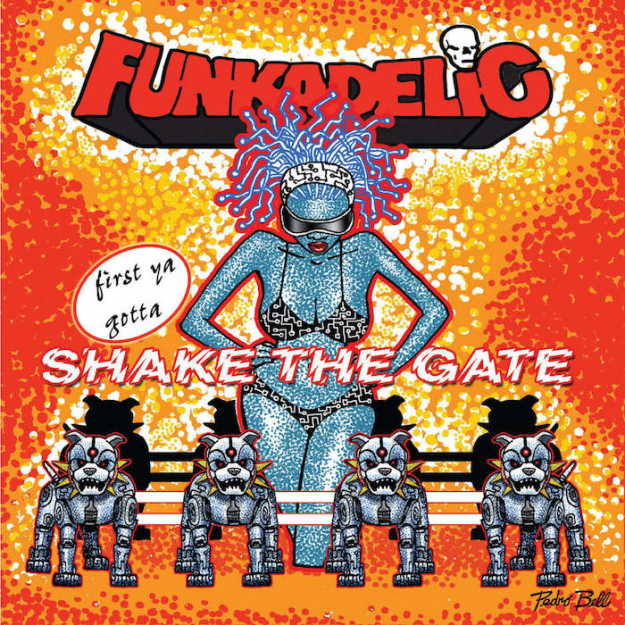 |
A confession: I embarrassingly didn't realize until more recently than I care to admit that Funkadelic released an album in 2014. An actual Funkadelic album. Not the "We're calling ourselves Funkadelic even though we're not really Funkadelic" game-playing of Connections & Disconnections. It's Funkadelic. Well, sort of. It's George Clinton's show, which is the most important distinguishing factor here, and includes contributions from alums such as Bernie Worrell, DeWayne "Blackbird" McKnight, Garry Shider, Cordell Mosson and even cover artist Pedro Bell, as well as guest contributor Sly Stone, fresh from several decades of living as a recluse. A couple things to note: It's a triple-disc set and runs nearly three and a half hours. I mean, good lord. But there's something kind of clever about releasing 33 new songs after a 33-year gap-that's one new song per year! And not all of it essential by any means. To dissect it song by song is kind of beside the point, but First Ya Gotta Shake the Gate is noteworthy mainly for existing and for being as overstuffed as it is. Very little of it is wholly disposable, but there's nothing here that lives up to the band's jaw-dropping streak in the '70s either. A marathon of updated versions of their trademark funk, often enjoyable, sometimes forgettable, but mostly just fine.
Medicaid Fraud Dogg (2018)
Label: The C Kunspyruhzy
Rating: 7.0
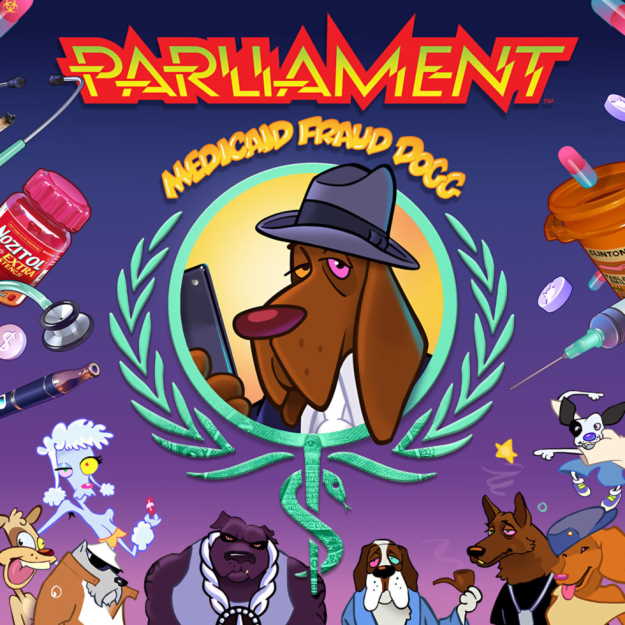 |
And after nearly 40 years, Clinton brought Parliament back to the studio with Medicaid Fraud Dogg, an almost two-hour attempt to make up lost time with songs that walk a balance between classic '70s Parliament raunch and more topical musings. And while a five-minute workout routine for the ass like "Oil Jones" doesn't necessarily mine new territory, it's a welcome return to the absurdity and hedonism that made Clinton and company's classic albums as much bonkers fun as they were. That said, there's a lot to digest here, some of it smooth and soulful ("Psychotropic", "Proof is in the Pudding"), some of it more g-funk than P-funk ("I'm Gon Make You Sick of Me"), some of it a little open-mic night ("Antisocial Media"). It's not Clinton's best by any means; it is a lot better than where he left off back in 1980, however, and there's no shortage of ideas here, even if some of them would have best been left on the cutting room floor. But it passes most of the tests required of a good P-Funk album: It's fun, it's colorful, and most of all, it's funky. Truth be told, Clinton could have just continued to coast on the P-Funk All Stars tours and that would have been just fine. Instead, he created something overstuffed and overwhelming, taking risks that don't always work out but more often than not resulting in something that sounds and feels great. Perhaps nobody expected it, but it's a good thing that we have it.
|
|